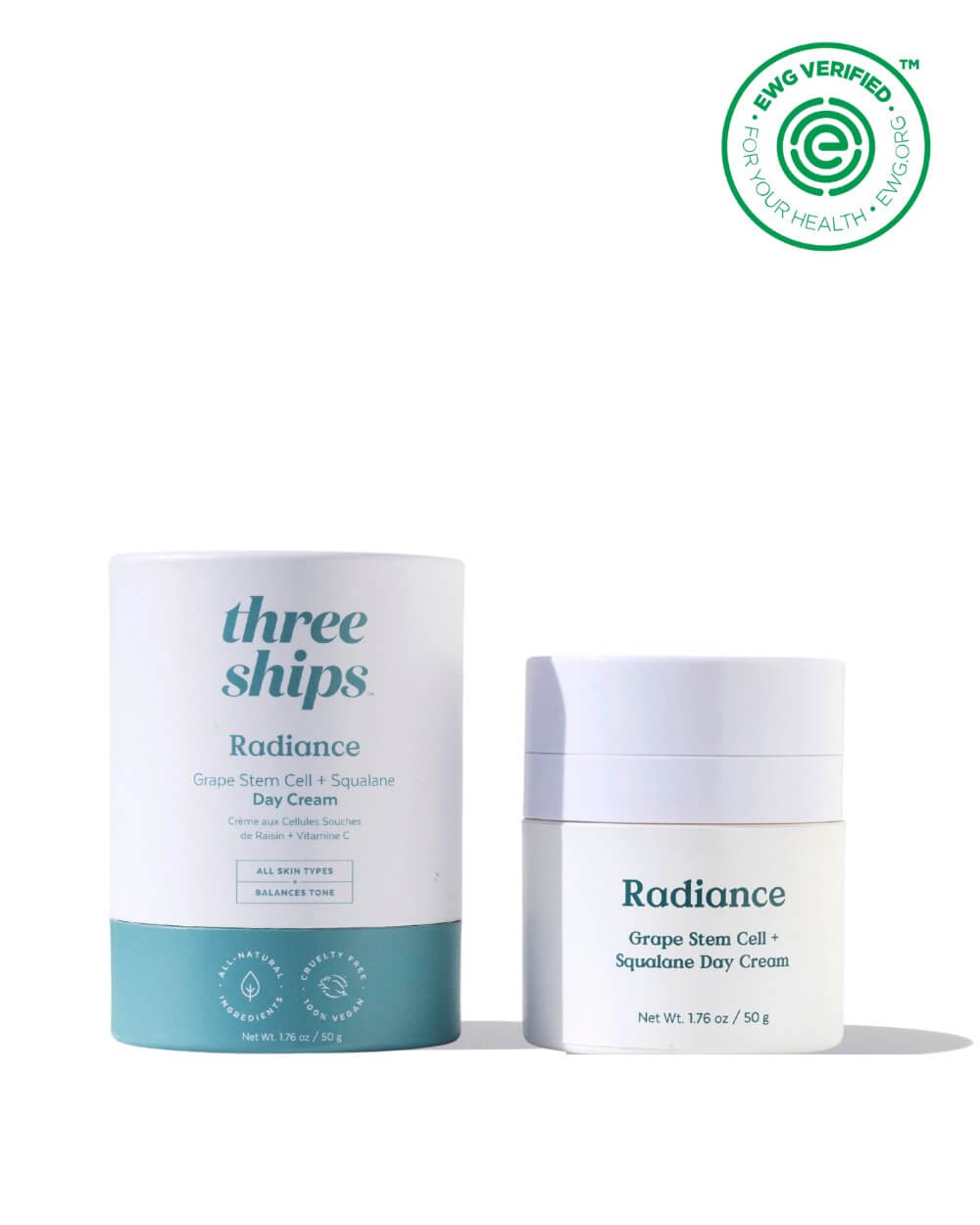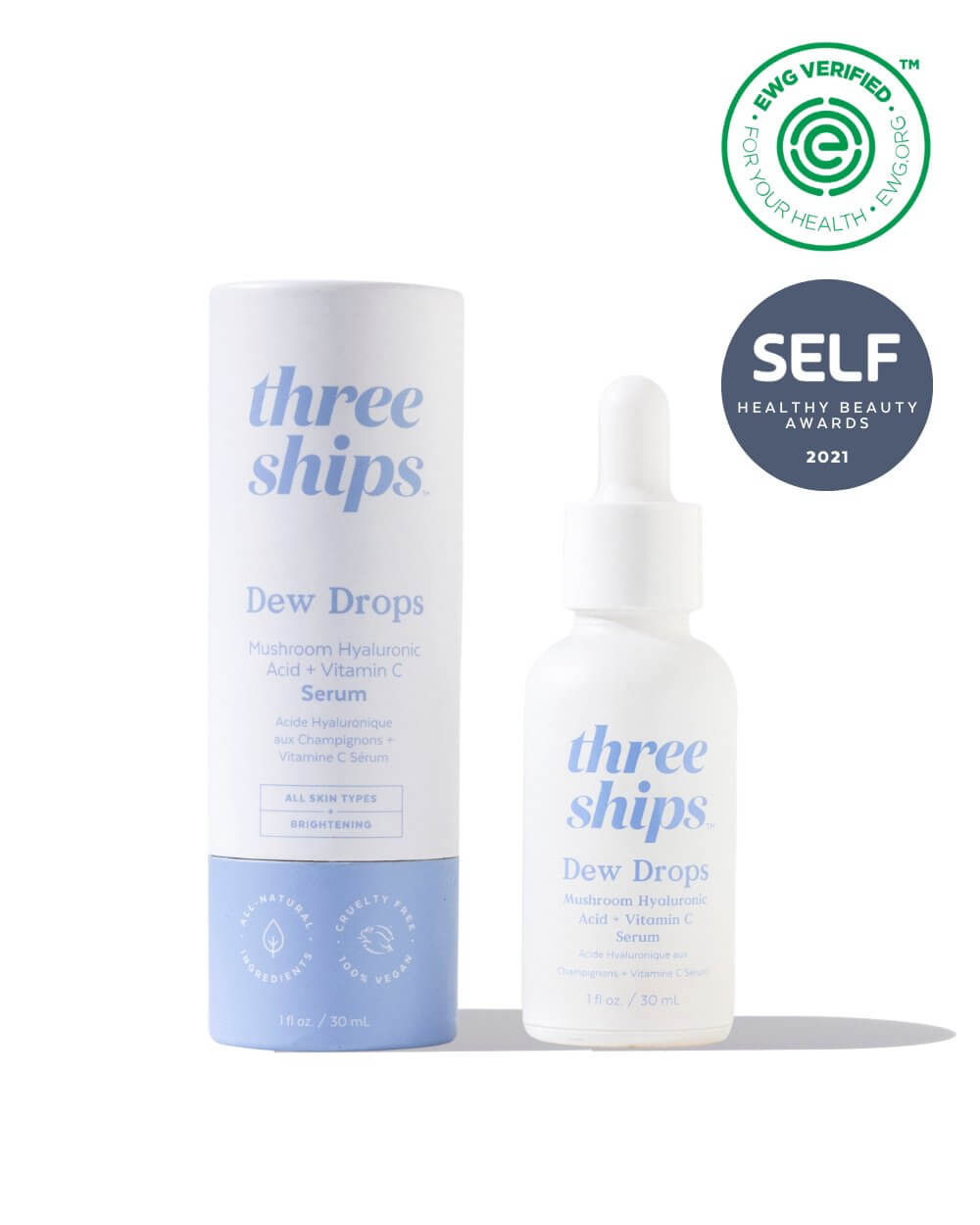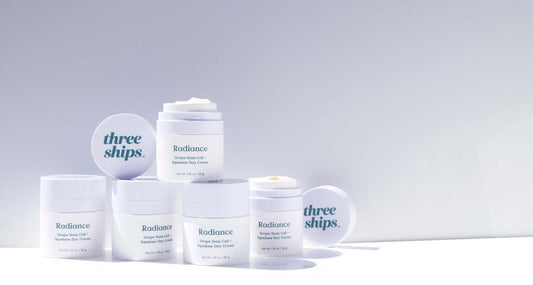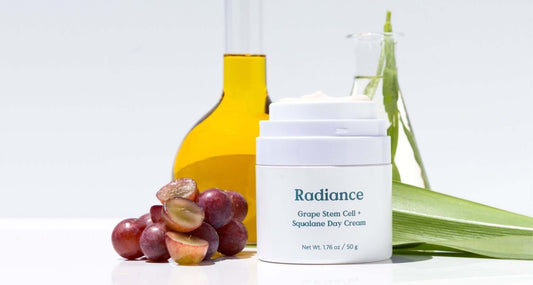At Three Ships, we believe that aging is a beautiful gift of life, and the signs of aging you experience (i.e. fine lines, wrinkles) are a testament to all the wonderful experiences you've had so far. However, we also believe that it's still essential and okay for you to want to care for your skin as you age.
Whether or not you’re already experiencing the effects of it, your skin is likely already in the process of making less of the essential compounds that as when you were younger. Squalane and Hyaluronic Acid are two ingredients you can look out for when selecting products that will help support your skin's needs as you age.
What Should I Know About Squalane and Hyaluronic Acid for Skin?
How can you be sure the products you choose will work and not end up irritating your skin or causing a breakout?
Luckily, you don’t have to have a masters in biology to understand skincare because our team of scientists does — and they’ve done the research for you. Here, we’ll fill you in on everything you need to know about squalane vs. hyaluronic acid, and how each helps your skin look forever young.
Squalane
The skin naturally produces a lipid called squalene. It’s not exclusive to humans, in fact, sharks produce squalene too!
Squalene is an emollient, which means it helps keep your skin hydrated and conditioned by forming a protective barrier on the skin and working to prevent moisture loss.
As we age, we naturally lose some of this production, which means drier, less hydrated skin. A solution? Squalane (with a lane and not a lene!).
Squalane is a sustainable lipid harvested from sugarcane remnants. Because it’s plant-based, it’s a cruelty-free option for topical application (unlike squalene harvested from shark livers). The skin easily absorbs this colorless, odorless ingredient because it’s nearly identical in chemical makeup to your skin’s natural oils.
- Pros: Squalane is natural, sustainable, easily absorbs into the skin, and has soothing properties that can help calm skin that is red, itchy, and irritated.
- Cons: What cons? Seriously, squalane is an amazing ingredient that works well for practically every skin type.
Because squalane is so close to your skin’s natural oil, it’s also suitable for problematic skin. It won’t clog pores or cause irritation like other moisturizing ingredients.
Looking to load up on squalane and quench your dry skin? Here’s how to get it right both day and night.
- Radiance Grape Stem Cell + Squalane Day Cream. Packed with plant-based ingredients that are intentional and effective, you’ll find more than the squalane in our day cream.
Grape stem cells help absorb harmful free radicals from UV light, giving you the ultimate antioxidant protection.
- Dream Bio-Retinol + Shorea Butter Night Cream. Your dreams just got a whole lot sweeter. Our night cream doses your skin with squalane, seed butters, and plant-based retinol from Picão Preto, a medicinal herb native to Brazil.
These ingredients work hard while you’re getting your zzz’s, allowing you to wake up with new skin cells, even skin tone, and softer, smoother skin. Who says beauty sleep isn’t real?
Squalane by itself is a great way to help encourage supreme hydration and make up for hydration that is naturally lost due to aging. But like any great superhero, it works better with a partner.
Hyaluronic Acid
Don’t call it a sidekick because it’s just as powerful on the skin as squalane. Hyaluronic acid is a naturally occurring acid in your body that works similarly to collagen by keeping your skin looking firm and plump. As you age, you guessed it; your skin simply makes less.
There are numerous hyaluronic acid options, but the problem with many has to do with the molecule size. Most hyaluronic acid molecules are large and settle on the surface of your skin. That’s a problem because it needs to penetrate deeply to work effectively. This is why many synthetically derived hyaluronic acids make your skin feel sticky after use.
Our solution: the Tremella mushroom.
Tremella extract is the perfect hyaluronic acid alternative because it’s a smaller molecule that can go deeper into the skin. Not to mention, it’s fully sustainable and plant-based, a win/win for you and the earth.
- Pros: Hyaluronic acid is moisturizing, working as a humectant to help moisture penetrate deeply for up to 12 hours. It also has wrinkle-reducing benefits to keep your skin looking youthful for longer. Hyaluronic acid also supports the health of your skin cells.
- Cons: Again, no cons — the hyaluronic acid we source from tremella mushrooms is effective yet very gentle. Even gentle enough for the most sensitive skin types.
Adding a hyaluronic acid serum to your skincare routine is an easy way to support your skin as you age and boost your total hydration.
- Dew Drops Mushroom Hyaluronic Acid + Vitamin C Serum. Dry skin? Dry your eyes; we’ve got the solution. Tremella mushroom extract boosts your skin’s hydration, penetrating deeply to restore hydration.
Kakadu plum helps supercharge your antioxidant defense, and actually contains 100x the Vitamin C as oranges, helping to brighten and plump your skin.
Three Ships Beauty keeps you at the helm of the ship, helping you understand your skin so you can care for it more effectively at all ages.
What Happens When the Skin Ages?
Collagen and Elastin Production
Two abundant proteins in your body help make up many of your important tissues. Collagen and elastin are found in tissues like bone, tendon, ligament, and muscle, but they’re also found abundantly in your skin.
- Collagen is the protein that helps your skin stay plump and firm. As your skin ages, you begin to produce less and less collagen. The collagen production in your skin begins to slow down in your 20s. In women, the first five years after menopause can mean a 30% loss of collagen.
When we lose collagen, we begin to notice a loss of fullness in places like underneath our eyes and the hollows of our cheeks.
- Elastin is another protein found in the skin, but this one promotes the skin’s ability to snap back into place after it has been stretched. As skin ages, elastin production (like collagen) begins to decline.
When elastin production begins to decline, the skin begins to sag, allowing wrinkles and fine lines to appear.
Less collagen and elastin are a natural part of aging. As the skin gets older, it also gets drier.
Dryness
Your skin is constantly renewing. As new skin cells are made, old skin cells are pushed to the top of the epidermis and sloughed off when you wash your face. This is called skin cell turnover.
The faster your skin renews, the healthier and more hydrated your skin may be.
As we age, skin cell turnover rates slow down. It can take skin cells between 28-30 days in young adults and as long as 45-50 days in seniors. With less turnover, we experience a natural decline in the oils our skin produces to protect and hydrate it, leaving it dry and rough.
What About Free Radical Damage?
Less collagen, less elastin, and dry skin. Oh my.
Unfortunately, it doesn’t stop there. Free radical damage also affects the health of your skin.
To understand what free radicals are and how they harm your skin, you need a quick reminder from middle school biology class. Everything is made up of molecules, and molecules want to be balanced with two electrons.
Free radicals are molecules with only one electron, so they search for extra electrons in balanced molecules, like those that make up your skin cells. When they rob those molecules of an electron, they damage it and damage the cell where the molecule is located.
Free radical damage can look like sagging skin, sunspots, or fine lines. Some free radical damage is natural, but other sources speed up the process. Free radicals come from sources like:
- Ultraviolet light
- Pollution from smog and smoke
- Fumes from some household cleaners
Answer Your Skin’s SOS With Three Ships
Even in your 20s, your skin begins to change. These changes happen over time, but certain factors, like exposure to free radicals, can make your skin change more rapidly than it should. Slow down the hands of time and restore moisture to adolescent levels by adding squalane and hyaluronic acid to your skincare.
Three Ships Beauty helps you benefit from these effective ingredients in easy-to-use, accessible, and sustainable products that help you feel good about your skincare.
Sources:
Collagen for Your Skin: Healthy or Hype? | Cedars-Sinai
Elastin: Structure, Function, Skin Care & Supplements | Cleveland Clinic
SEER Training: Layers of the Skin | Training.Seer.Cancer.Gov




